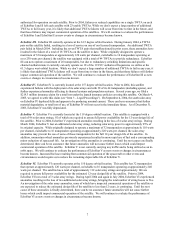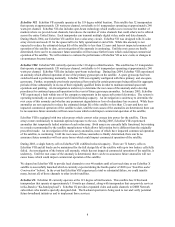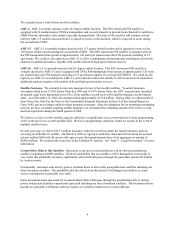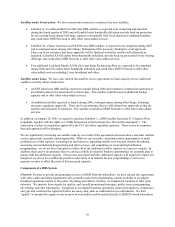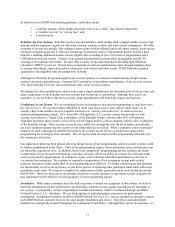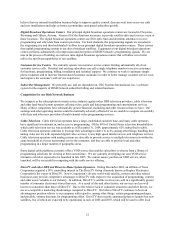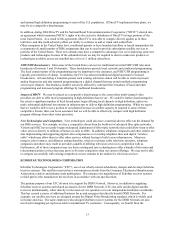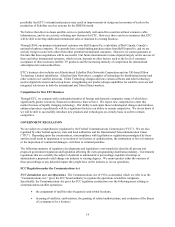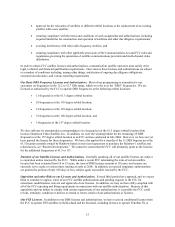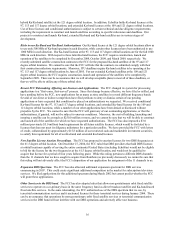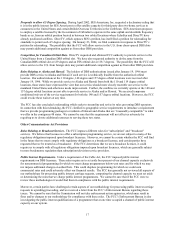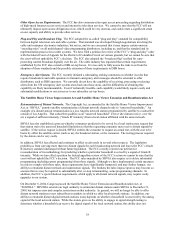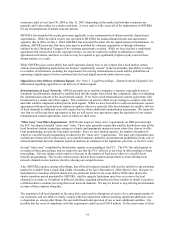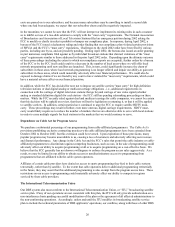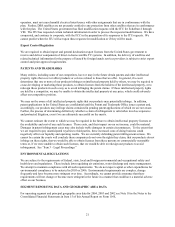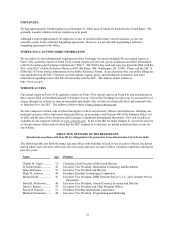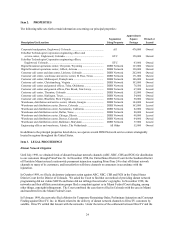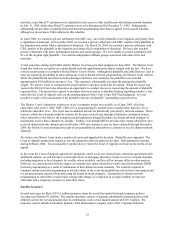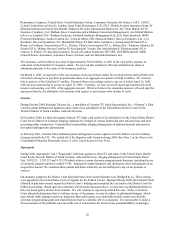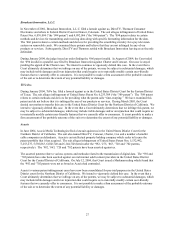Dish Network 2004 Annual Report Download - page 25
Download and view the complete annual report
Please find page 25 of the 2004 Dish Network annual report below. You can navigate through the pages in the report by either clicking on the pages listed below, or by using the keyword search tool below to find specific information within the annual report.17
Proposals to allow 4.5 Degree Spacing. During April 2002, SES Americom, Inc. requested a declaratory ruling that
it is in the public interest for SES Americom to offer satellite capacity for third party direct-to-home services to
consumers in the United States and certain British Overseas Territories in the Caribbean. SES Americom proposes
to employ a satellite licensed by the Government of Gibraltar to operate in the same uplink and downlink frequency
bands as us, from an orbital position located in between two orbital locations where EchoStar and DirecTV have
already positioned satellites. DirecTV, which opposes SES’s petition, has itself filed a petition for rulemaking for
standards to permit such 4.5 degree spacing. On January 23, 2004, we filed comments in response to DirecTV’s
petition for rulemaking. The possibility that the FCC will allow service to the U.S. from closer-spaced DBS slots
may permit additional competition against us from other DBS providers.
Competition for Canadian Orbital Slots. DirecTV requested and obtained FCC authority to provide service to the
United States from a Canadian DBS orbital slot. We have also requested authority to do the same from the
Canadian DBS orbital slot at 129 degrees and an FSS orbital slot at 118.7 degrees. The possibility that the FCC will
allow service to the U.S. from foreign slots may permit additional competition against us from other DBS providers.
Rules Relating to Alaska and Hawaii. The holders of DBS authorizations issued after January 19, 1996 must
provide DBS service to Alaska and Hawaii if such service is technically feasible from the authorized orbital
location. Our authorizations at the 110 degree, 148 degree and 157 degree orbital locations were received after
January 19, 1996. While we provide service to Alaska and Hawaii from both the 110 and 119 degree orbital
locations, those states have expressed the view that our service should more closely resemble our service to the
mainland United States and otherwise needs improvement. Further, the satellites we currently operate at the 148 and
157 degree orbital locations are not able to provide service to Alaska and/or Hawaii. We received temporary
conditional waivers of the service requirement for both the 148 and 157 degree orbital locations. However, the FCC
could revoke these waivers at any time.
The FCC has also concluded a rulemaking which seeks to streamline and revise its rules governing DBS operators.
In connection with this rulemaking, the FCC clarified its geographic service requirements to introduce a requirement
that we provide programming packages to residents of Hawaii and Alaska that are “reasonably comparable” to what
we offer in the contiguous 48 states. We cannot be sure that this requirement will not affect us adversely by
requiring us to devote additional resources to serving these two states.
Other Communications Act Provisions
Rules Relating to Broadcast Services. The FCC imposes different rules for “subscription” and “broadcast”
services. We believe that because we offer a subscription programming service, we are not subject to many of the
regulatory obligations imposed upon broadcast licensees. However, we cannot be certain whether the FCC will find
in the future that we must comply with regulatory obligations as a broadcast licensee, and certain parties have
requested that we be treated as a broadcaster. If the FCC determines that we are a broadcast licensee, it could
require us to comply with all regulatory obligations imposed upon broadcast licensees, which are generally subject
to more burdensome regulation than subscription television service providers.
Public Interest Requirements. Under a requirement of the Cable Act, the FCC imposed public interest
requirements on DBS licensees. These rules require us to set aside four percent of our channel capacity exclusively
for noncommercial programming for which we must charge programmers below-cost rates and for which we may
not impose additional charges on subscribers. This could displace programming for which we could earn
commercial rates and could adversely affect our financial results. The FCC has generally not reviewed all aspects of
our methodology for processing public interest carriage requests, computing the channel capacity we must set aside
or determining the rates that we charge public interest programmers. We cannot be sure that if the FCC were to
review these methodologies it would find them in compliance with the public interest requirements.
Moreover, certain parties have challenged certain aspects of our methodology for processing public interest carriage
requests in a pending proceeding, and we received a letter from the FCC’s Enforcement Bureau regarding these
issues. We cannot be sure that the Commission will not take enforcement action against us, which may result in
fines and/or changes to our methodology for compliance with these rules. The FCC’s Enforcement Bureau is also
investigating the public interest qualifications of a programmer that at one time occupied a channel of public interest
capacity on our system.


